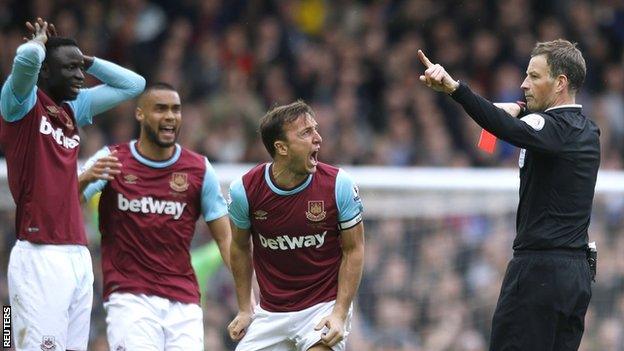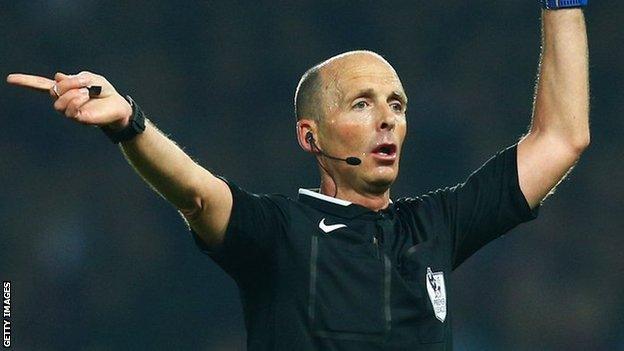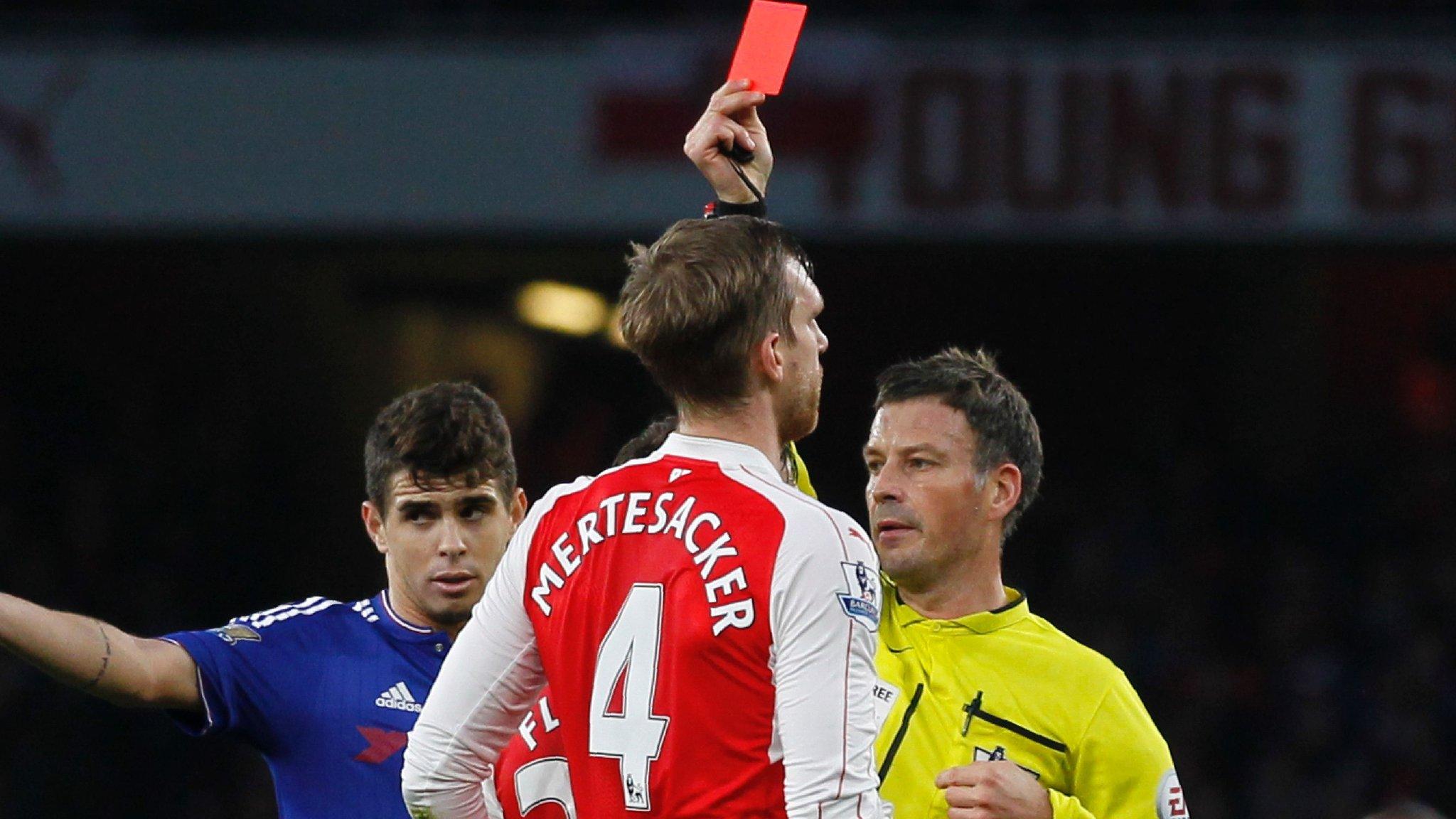Euro 2016: A guide to the new laws in football
- Published

Mark Clattenburg (right) will be England's refereeing representative at Euro 2016
England's friendly matches before this summer's European Championship will be played with new laws in mind.
The 95 changes come into effect on 1 June, and the Football Association wants players to get used to them before the tournament in France.
It has agreed with the Turkish and Australian FAs to adopt the laws when England play them this month.
Changes include the end of an automatic red card for denying a goalscoring opportunity.
Football's rulemakers, the International Football Association Board (Ifab), drew up the list of changes earlier this year after 18 months of consultation.
Former referee and Ifab technical director David Elleray said the revision would make things clearer for players, officials and fans.
"We should have a much more consistent interpretation across the world because we've made it much clearer what should happen in certain situations.
"That should reduce controversy and confusion."
Many of the alterations are designed to make the language used much clearer - for example, a clumsy explanation of the number of players needed for a match to take place has been replaced by a simple sentence: "A match may not start or continue if either team has fewer than seven players."
Roy Hodgson to pick strongest England team
Changes in language aside, here are the other things that will be different about football from 1 June:
Law 1 - the field of play
Logos permitted on corner flags (previously banned).
Mix of artificial and natural surfaces allowed on field of play (previously banned).
Law 3 - the players
If a substitute, sent-off player or match official interferes with play, causing the game to be stopped, it will result in a direct free-kick or penalty (previously indirect free-kick or drop-ball).
If a substitute, team official or outside agent stops a ball going into the goal, the referee can apply the advantage rule and award a goal.
Law 4 - the players' equipment
Players wearing undershorts or tights have to make sure they are the same colour as those worn by any team-mates - and they must also match their shorts.
A player leaving the field of play to change their boots can only be allowed back on by the referee.
Law 5 - the referee
Referees have the authority to take action from when they enter the field of play for the pre-match inspection, not from the start of the game - which means players could be sent off for an offence committed while warming up. But yellow cards can only be issued from the start of the match.
Players injured by opponents who are then sent off do not need to leave the pitch for treatment.
Law 7 - duration of the match
Time taken for drinks breaks can now officially be added on at the end of a game.
Law 8 - the start and restart of play
The ball no longer has to move forward at a kick-off - it just has to move for the game to start.
Referees should not 'manufacture' dropped ball situations, in terms of who takes them, or the outcome.
Law 10 - Determining the outcome of a match
Deciding which end a penalty shootout should take place is to be done by a coin-toss, subject to condition of the pitch, or safety concerns. It is no longer the referee's choice.
A team with more players than the other when the shootout starts must reduce the number of takers so they have the same number of eligible players - this will stop teams who have had a player sent off having their better penalty takers available sooner.
Law 11 - offside
Hands and arms are not included when judging offside.
Free-kicks for offside can be taken from where the offside player received the ball.
Law 12 - fouls and misconduct

Indirect free-kicks used to be awarded when restarting games following offences against match officials. But lawmakers thought this sent out the wrong message, so they have upped it to a direct free-kick
A free-kick or penalty can only be awarded while the ball is in play.
Denying an obvious goalscoring opportunity in the penalty area is no longer a straight red card - unless the offence is holding, pulling or pushing; there's no attempt to play or no possibility of making a challenge; or it's an offence which is punishable by a red card, no matter where on the pitch it happens - violent conduct, for example.
Violent conduct is punishable by a red card even if no contact is made.
An offence against a match official will result in a direct free-kick or penalty.
Law 13 - free-kicks
When fouls are committed off the pitch when the ball is in play, the match is restarted with a free-kick on the touchline nearest where the incident occurred. A direct free-kick will be awarded for direct free-kick offences - and a penalty could be awarded if it happens parallel to the penalty area.
Law 14 - the penalty kick
Players who feint to kick the ball once they have taken a run-up when taking a penalty will get booked for unsporting behaviour. Feinting in the run-up is allowed. And goalkeepers who come off their line too early will also be booked.
Law 15 - the throw-in
Opposing players who try to impede a throw-in will be cautioned if they are standing under two metres away.
Law 17 - the corner kick
The wording has been changed in the laws to say: "The ball is in play when it is kicked and clearly moves." This is to stop players "unsportingly" touching the ball and pretending the corner has not been taken, to gain an advantage.
Have you added the new Top Story alerts in the BBC Sport app? Simply head to the menu in the app - and don't forget you can also add score alerts your football team and more.
- Published22 May 2016

- Published14 April 2016

- Published20 June 2016

- Published7 June 2019

- Published2 November 2018
